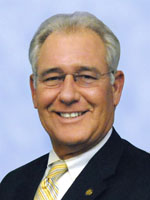By DARA KAM
THE NEWS SERVICE OF FLORIDA
The Florida Senate on Wednesday overwhelmingly supported a prison-reform package that includes a commission to oversee the state’s embattled corrections agency, but the House is poised to consider a competing plan that lacks the oversight panel.
Senate Criminal Justice Chairman Greg Evers pushed forward the changes in the aftermath of stories about inmate abuse at the hands of prison guards, rampant corruption inside prisons and allegations of retaliation against whistleblowers.
Evers’ bill (SB 7020) would make it easier for inmates to file complaints, create new penalties for rogue guards who abuse prisoners and establish a governor-appointed commission to oversee prisons and investigate wrongdoing. The measure, approved by a 36-1 vote, would also allow inmates’ families or lawyers to pay for independent medical evaluations and expand opportunities for old or sick inmates to get out of prison early.
The proposal would also require corrections workers to videotape all “non-reactionary” use-of-force incidents — non-emergency situations in which inmates are gassed with noxious chemicals. Each prison would have to track use-of-force incidents and the Department of Corrections would have to post an annual report documenting those incidents on its website.
“They don’t go to prison to be sentenced to death unless they are put on Death Row, and we’ve had too many questionable deaths in our prisons. I just really hope this is the beginning of the end of the crisis and the unfortunate circumstances that we’ve seen in our penal institutions,” Senate Minority Leader Arthenia Joyner, D-Tampa, said.
Evers, whose Panhandle district includes three prisons and numerous work camps, made several surprise visits to institutions over the past several months. The visits revealed inadequate inmate health care, overworked and understaffed prison guards and shoddy equipment, the Baker Republican previously said.
“We will go to the point that when you go to prison that you will be given the opportunity to enter the Department of Corrections. You will be allowed to rehabilitate yourself … and you will come out alive on the other side and not leave the prison in a body bag,” Evers said earlier this year.
House Speaker Steve Crisafulli and other GOP House leaders have repeatedly rejected the oversight commission, objecting that the effort would create another “layer of bureaucracy.” Critics of the commission also say that a previous iteration of the oversight panel did not work.
On Wednesday, Crisafulli told reporters his chamber is prepared to release an alternative plan that could further decentralize the corrections agency, now divided into three regions. The department oversees more than 100,000 prisoners, nearly as many probationers and employs more than 20,000 workers.
“One thing we’ve talked about is more of a regional approach. They’re obviously looking at an overall board, so to speak, to go back to,” Crisafulli, R-Merritt Island, said. “And for us, for me, I would think each region has a little bit of different challenges, so having that opportunity to maybe handle that at a regional approach versus one location in Tallahassee might be a better way to go. …We’re going to work out those differences.”
Evers said he had initially rejected the oversight panel but, at the suggestion of Sen. Rob Bradley, included it in his package after making the prison visits and hearing repeated stories from inmates and workers about wrongdoing, abuse and staffing issues.
The new commission would have investigatory powers and be in charge of policing prisons, now handled by the Office of the Inspector General, which answers to Gov. Rick Scott’s chief inspector general.
Bradley, a former prosecutor who for two years chaired the Senate’s criminal-justice budget committee, insists that an independent panel is necessary to restore trust because the agency’s inspector general “has not done a good job of rooting out bad actors.”
Corrections Secretary Julie Jones, brought out of retirement by Scott earlier this year to take over the troubled agency as the governor’s fourth corrections chief in as many years, has committed to expanding internal reforms launched last year by her predecessor, former Secretary Mike Crews, and is especially interested in changing how mentally ill inmates are treated.
“I do appreciate her words. I believe her when she says she’s dedicated to reform. But we’ve heard it before by some of her predecessors. And there’s been seven or eight secretaries in 10 years. So we need more than words. We need to have verification that reforms are actually occurring. That’s why that oversight is so important to us,” Bradley, R-Fleming Island, said.
